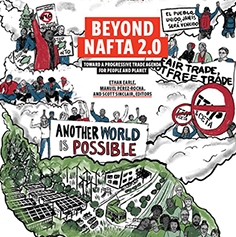Canada’s ambitions in courting US actors to support their trade agenda was on full display last week as Prime Minister Justin Trudeau was inaugurating a tour in the United States to promote his administration’s trade agenda. He spoke at the University of Chicago’s Institute of Politics followed by speeches in San Francisco and Simi Valley, California later last week. Meanwhile, Trudeau’s forieign minister, Chrystia Freeland, spoke to Canada’s Parliament about NAFTA and the administration’s trade agenda. We must remind Canadian negotiators that the people in the United States will not forget that some of their initial proposals advocated for progressive change, nor will we accept current advocacy for policies that benefit increased corporate power.
As the movement against gender violence has rocked major institutions in the United States, it is essential that Canada insist on the inclusion of a gender chapter in the NAFTA re-negotiations that will translate into enforceable economic rights for women and trans folks throughout North America. It was just last September that Canada demanded that the United States end ‘right-to-work’ laws which allows for states to cripple unions and their ability to organize for increased wages and dignified working conditions. We want assurances that an Indigenous Peoples Chapter in NAFTA will be written in partnership with the indigenous peoples of North America and will be seen as a critical item on Canada’s agenda. We cannot afford to negotiate anymore trade deals that welcome the oil industry and remains silent on the need to transition into an economic model that addresses climate change.
It is not progressive to care to keep some semblance of an Investor-State Dispute Settlement (ISDS) than it is for gender equity, for strong labor and environmental standards, for indigenous peoples’ rights. It is not honest to demand an end to ‘right-to-work’ laws and then forget the plight of workers in the United States, specially those who have lost their jobs because of NAFTA. It is not progressive to include provisions that are merely suggestions which do not require true commitment. While the inclusion of these provisions is not solely the responsibility of Canada’s government, we will not be satisfied by empty promises and talking points.
Illinois has lost more than 290,000 of its manufacturing jobs – nearly a third – since NAFTA went into effect. More than 112,000 specific Illinois jobs have been certified under one narrow government program, Trade Adjustment Assistance (TAA), as lost to outsourcing or imports since NAFTA. That is why local labor union and civic organizations were flyering and rallying outside of Trudeau’s speaking gig in Chicago, because if NAFTA and the free trade model are not replaced with deals that truly benefits people and the planet, the protests will only continue and grow.
Trade for People and Planet

